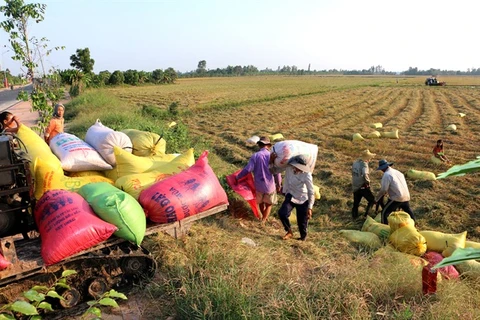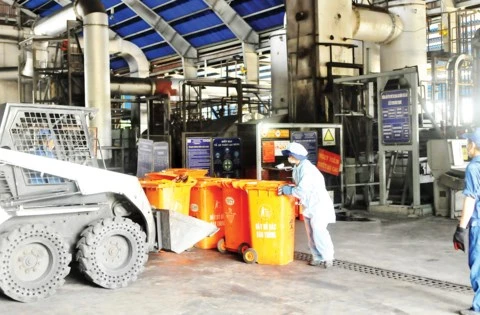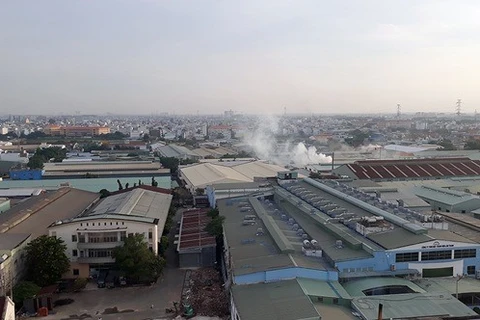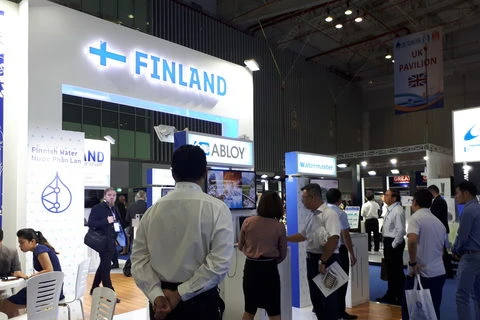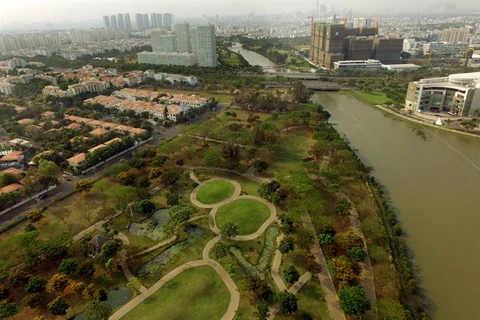
Binh Hung waste water treatment plant in HCM City. One of the main tasks this year for the city’s Department of Natural Resources and Environment will be to improve waste treatement management. (Photo: nld.com.vn)
HCM City (VNA) - The Ho Chi Minh City Department of Natural Resources and Environment plans to improve waste and water management as well as land-use management this year.
Nguyen Toan Thang, director of the department, revealed the four main targets for 2018 at a meeting on January 22 in the city.
They include reducing groundwater exploitation, from 716,000cu.m to 487,000cu.m per day, a decrease of 31 percent, and having 100 percent of solid waste treated in accordance with environmental standards.
Figures from the department show that between December 31, 2016 and December 31, 2017 the city treated around 3.2 million tonnes of domestic waste.
Other targets would ensure that 95 percent of industrial waste water and 100 percent of medical waste water will be treated this year.
The city has also been assigned 17 tasks in total this year.
Among them are better monitoring of the conversion of land-use purposes and relocation compensation; submitting lists for the climate-change adaptation programmes; enhancing garbage sorting at source and encouraging international cooperation in sharing information on climate and environmental issues; and calling for investment in waste treatment projects.
Some of the tasks are built on last year’s targets, according to Thang.
Tran Vinh Tuyen, vice chairman of the municipal People’s Committee, praised the department for achieving last year’s targets, saying it was a “tough job”.
“This year, we achieved a very high GRDP growth rate of 8.25 percent. This is very exciting as it helped us reach our budget target in 2017,” he said.
According to the city’s State treasury, the total State budget revenue in HCM City reached 347.98 trillion VND (15.32 billion USD) in 2017, slightly more than the year’s target, and up 13.5 percent compared to 2016.
“The good results that we achieved last year were because of the joint efforts of the entire political system, including the natural resources and environment department,” he said.
He spoke highly of Thang for clearly dividing the tasks, which made it easier to monitor and evaluate the results.
He instructed the department to send its draft proposals on fees for industrial waste water treatment and restrictions on groundwater exploitation to the HCM City Fatherland Front Committee and related enterprises and business associations for feedback before submitting it to the city’s People’s Council.
Regarding the conversion of land-use purposes, Tuyen said: “As the city does not play a role in ensuring food security for the country, it should allow switching some agricultural land for commercial use to increase the State budget revenue.”
He asked the department to ensure appropriate land-use fees for enterprises and promptly issue land-use certificates, saying that lending land to businesses would help generate revenue for the city budget.
Regarding environmental management, Tuyen asked the department to adopt more new air and water pollution monitoring technologies.
He said the department should voluntarily provide information on pollution issues, including, for example, Ba Bo Canal pollution, at meetings of the city People’s Council, rather than wait until the city administration requests for a report.
Though the department has always been a pioneer in raising public awareness about environmental protection, some of its activities last year did not bring good results, he added.
Next month, the city will hold a workshop calling investment for projects that will relocate residents in 20,000 houses in slums along canals and rivers.
Tuyen asked the department to take part in the workshop and to share its thoughts and comments.
“Settling this issue not only means these people will have a new place to live, but it will also help improve their environmental hygiene and health,” he said.
Once the slums are removed, river tourism will have more potential to develop, he added. - VNA
VNA
